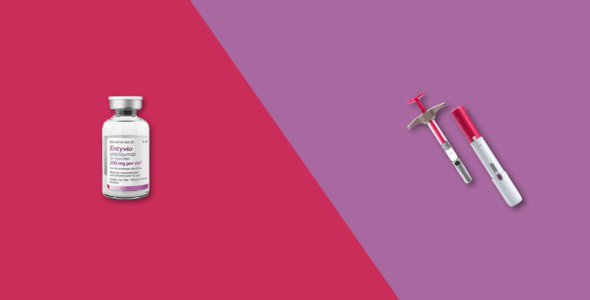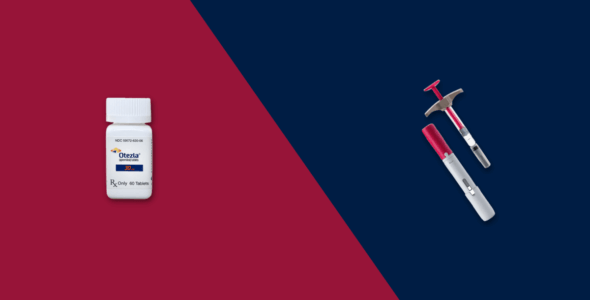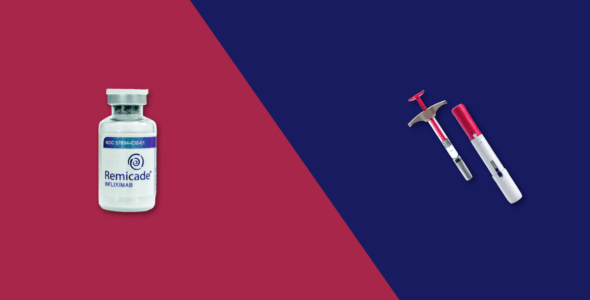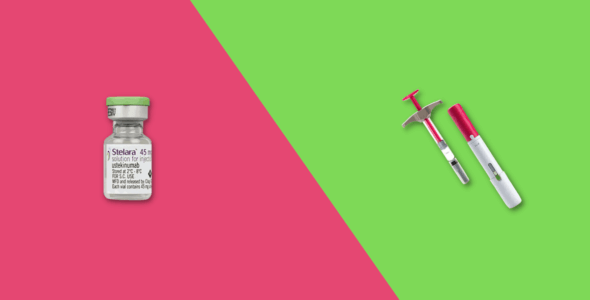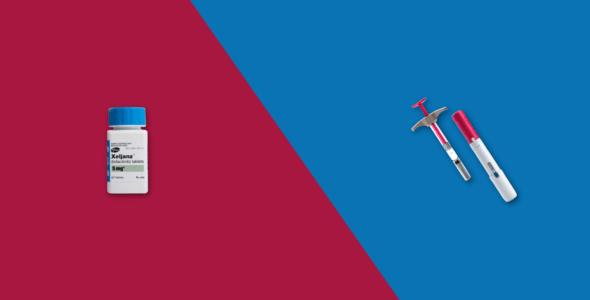The American College of Rheumatology treatment guidelines recommends biologic drugs such as Enbrel (etanercept), Humira (adalimumab), Cimzia (certolizumab pegol), Simponi (golimumab), and Remicade (infliximab) as a treatment option after methotrexate for people with autoimmune conditions such as rheumatoid arthritis. These drugs are also classed as disease-modifying antirheumatic drugs (DMARDs), which means they can treat the underlying cause of your condition and reduce inflammation. DMARDs can improve symptoms such as joint damage, pain, and swelling.
Today, we’ll focus on two of the options available: Enbrel vs Humira. Although they fall into the same class of drugs, share certain features and both have shown to be effective in clinical trials, they also have differences. Let’s get to know these medications and then you can decide which one is right for you.
What is Enbrel?
Enbrel is the brand name of a medication manufactured by Amgen containing the active ingredient etanercept. It is approved by the US Food & Drug Administration (FDA) to treat the following autoimmune diseases:
- Moderate to severe chronic plaque psoriasis
- Psoriatic arthritis with or without methotrexate
- Moderate to severe rheumatoid arthritis with or without methotrexate
- Ankylosing spondylitis (inflammation of joints in the spine).
- Moderate to severe polyarticular juvenile idiopathic arthritis (joint pain and inflammation in children and adolescents with more than 4 joints affected)
What is Humira?
Humira is an FDA-approved medication manufactured by Abbie Inc. containing the active ingredient adalimumab.
Humira is approved by the FDA to treat the following inflammatory autoimmune diseases:
- Moderate to severe plaque psoriasis who are candidates for systemic therapy or phototherapy
- Active psoriatic arthritis in adults
- Rheumatoid arthritis in adults
- Ankylosing spondylitis in adults
- Ulcerative colitis in adults
- Juvenile idiopathic arthritis in children aged 2 years and older
Humira is also approved to treat similar non-autoimmune inflammatory diseases:
- Crohn’s Disease in adults and children aged 6 years and older
- Hidradenitis suppurativa (HS) in adults and children aged 12 years and older
- Uveitis in adults and children aged two years and older
Do Enbrel and Humira work in the same way?
Yes. Once Enbrel or Humira is injected into your body, the active ingredients in the drugs which are known as tumor necrosis factor (TNF) inhibitors or TNF blockers start working to help reduce inflammation. Your immune system triggers inflammation by releasing a signaling molecule called TNF-alpha (an antibody). This molecule attaches itself to areas inside your cells, beginning the process that causes inflammation. The active ingredients in Enbrel and Humira stop this from happening. They attach themselves to TNF-alpha molecules, stopping them from working. This limits the amount of inflammation your immune system can cause.
How do you take Enbrel and Humira?
You are given Enbrel and Humira by subcutaneous injection (injecting it under your skin) using either a pre-filled syringe or an injectable pen. It is important to use a new needle each time to prevent the risk of infection. You may get injection site reactions such as redness, bruising, or irritation after administration, but this will settle down after a few hours.
What are the side effects of Enbrel and Humira?
As Enbrel and Humira belong to the same drug class their side effects are similar.
Common side effects include:
- Injection site reactions
- Sinus infection
- Headache
Serious side effects include:
- Suppression of the immune system
- Increased risk of cancer, particularly lymphoma
- New or worsening heart failure
- New or worsening psoriasis
- Allergic reactions
- Serious infections
What about other medications?
Some people take Enbrel or Humira alone, and others take them in combination with methotrexate.
Enbrel and Humira have drug interactions with the following drugs
If you have a hepatitis B virus infection, taking Enbrel or Humira could activate your infection. Your doctor will test your blood to make sure you don’t have hepatitis B before you receive either of these drugs.
Other medical conditions may affect your treatment with Enbrel or Humira so you should always seek medical advice from the healthcare professional prescribing your drugs.
What are autoimmune diseases?
Your immune system kills and removes harmful pathogens that can make you ill and help you recover from injuries. However, sometimes your immune system can mistakenly attack healthy parts of your body, causing an autoimmune disease. Many of these autoimmune diseases cause inflammation.
Inflammation is a vital part of your immune system’s response to infection. It signals to your body to defend itself and that repair is needed. However, inflammation in healthy tissue, especially if it persists, can cause damage. Rheumatoid arthritis is caused by chronic inflammation in your joints, while ankylosing spondylitis is caused by chronic inflammation in your spine.
Are biosimilars available for Enbrel and Humira?
Biosimilar alternatives to both Enbrel and Humira exist. Erelzi is a biosimilar to Enbrel available in the US. Humira biosimilars are not yet available for use in the United States.
Does Enbrel cause weight gain?
No, it is unlikely Enbrel will cause weight gain. Weight gain was not seen as a side effect in clinical trials. On the other hand, if you have unexplained weight loss, it could be a sign of a serious infection caused by Enbrel e.g hepatitis B and tuberculosis. Speak to your doctor right away if you experience any changes in weight.


